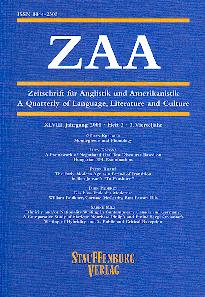|
Neue Seite 1
Aus dem Inhalt
Aus dem
Inhalt:
-
Göran
Kjellmer: Mondegreens
and Phonology
-
Lucy
Katona: A Framework of Negotiated Oral Test Discourse Based on Hungarian EFL
Examinations
-
Peter
Krahé: The Early Modern Age as a Period of Transition in Ben Jonson’s
“To Penshurst”
-
Dirk Padeken: Das Böse Ende der Moderne: William
Faulkner, Cormac McCarthy, Bret Easton Ellis
(abstract)
-
Sabine
Milz: Ethnicity and/or Nationality Writing in Contemporary Canada
and Germany: A Comparative Study of Marlene Nourbese Philip’s
and Emine Sevgi Özdamar’s Writing of Hybridity and Its Public
and Critical Reception
-
Buchbesprechungen
-
Lars Hermerén. English for Sale: A Study of the Language of
Advertising. (Albrecht Neubert)
-
Manfred
Görlach. Studies in Middle English Saints’ Legends. (Thomas Kohnen)
-
Robert
Mayer. History and the Early English Novel: Matters of Fact from Bacon
to Defoe. (Ewald Mengel)
-
Theo Stemmler/Stefan Horlacher, eds.
Erscheinungsformen des Sonetts. (Sonja Fielitz)
-
Christoph Bode/Ulrich Broich, eds. Die Zwanziger
Jahre in Großbritannien: Literatur und Gesellschaft einer
spannungsreichen Dekade. (Wolfgang Wicht)
-
Dieter Mehl/Christa Jansohn, eds. The
First and Second Lady
Chatterley Novels. (Jürgen Donnerstag)
-
Hildegard Möller. A Wake Bestiary: Mit
Untersuchungen zur Tiersymbolik in
James Joyces Finnegans Wake. (Helmut Bonheim)
-
Christoph Schöneich. Edmund Talbot und seine Brüder:
Englische Bildungsromane nach 1945. (Ralf Schneider)
-
Martina Löschnigg. Edward Bond: Dialog und
Sprachgestus. (Peter Paul Schnierer)
-
Nancy
Ruttenberg. Democratic Personality: Popular Voice and the Trial of
American Authorship. (Gabriele Linke)
-
Bernd C. Peyer. The Tutor’d Mind: Indian Missionary-Writers in Antebellum
America. (Gesa
Mackenthun)
-
Jack
Zipes. When Dreams Came True: Classical Fairy Tales and Their Tradition.
(Mirosawa Buchholtz)
-
Kati
Röttger/Heike Paul. Differenzen
in der Geschlechterdifferenz. (Susanne Scholz)
-
Jörg Helbig. Geschichte des britischen Films.
(Claudia Sternberg)
Dirk Padeken: Das Böse Ende
der Moderne: William
Faulkner, Cormac McCarthy, Bret Easton Ellis
In pre-modern times the existence of evil confirmed the Divinity of God – or
so went Aurelius Augustinus’ theory of the theodicy. In modern times the
existence of evil confirmed the sovereignty and the autonomy of the human – or
so went Ralph Waldo Emerson’s or William James’s theory of the anthropodicy.
This essay focuses on three 20th century novels by William Faulkner, Cormac
McCarthy and Bret Easton Ellis which – against this very backdrop – dare to
face evil as a radical and ontological power instead, a power of annihilation,
devoid of any hope of reconciliation. In their respective attempts to ask for
the position of the self in a world in which evil takes its solid turn,
Faulkner, on the one hand, falls back upon gnostic ideas and Cormac McCarthy, on
the other hand, reflects about ancient cosmology, especially the dark
philosophical insights of Heraclitus. Ellis finally testifies to the ultimate
triumph of evil and the failure of both cosmology and humanity.
|


